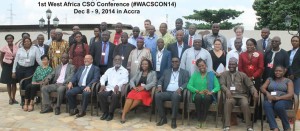West African civil societies discuss strategies to meet MDGs and ECOWAS Vision 2020
 Civil society leaders from across West Africa met in Accra December 8 and 9, 2014 at the first annual West Africa Civil Society Conference to strategize for the post-2015 and ECOWAS Vision 2020 Development Agenda.
Civil society leaders from across West Africa met in Accra December 8 and 9, 2014 at the first annual West Africa Civil Society Conference to strategize for the post-2015 and ECOWAS Vision 2020 Development Agenda.
The key objectives of the meeting were to institute an annual platform for Civil Society Organizations (CSOs) to discuss developmental issues, to review CSO’s participation in post -2015 and strategically devise ways to influence the ongoing discourses at the regional level, to discuss the strategies that civil society can use to effectively engage with ECOWAS and the vision 2020 through WACOF and lastly to highlight key capacity building areas to enable effective engagement,
These objectives draw from a situational analysis of key challenges that West Africa is currently facing.
On the first day of the meeting, Mr. Daniel Batidam, governance advisor, Office of the President of Ghana noted that the region is threatened by climate change, rapid population growth, poor governance, increase in infectious and non-infectious diseases including the Ebola virus pandemic which governments are currently battling and security threat.
Mr. Batidam who delivered the speech on behalf of the President of Ghana and chairman of ECOWAS said, “One does not need to be an expert to recognise the very negative effects these security threats have on any economy, and to notice how these threats restrict participation in public life, destroy infrastructure and shatter lives.
He further noted that as civil society leaders, they should be resolute in their determination to resolve these challenges and move West African states to a much higher level of development and regional prosperity.
Nana Asantewaa Afadzinu, Executive Director of the West Africa Civil Society Institute (WACSI), stated that the convening was not only to deliberate on the regional development agenda of ECOWAS Vision 2020, but to interrogate the role of civil societies in making the agenda real in the lives of the ordinary person.
Mrs Afadzinu observed that though civil societies are recognised when it comes to protocol, there seems to be a number of obstacles that have prevented civil societies from fully assuming their role and engaging effectively with government.
The meeting, organised by the West Africa Civil Society Institute (WACSI), in collaboration with the West Africa Civil Society Forum (WACSOF) with support from the Commonwealth Foundation brought together civil society actors from 13 West African countries.
WACSI and WACSOF are two regional organisations that are committed to creating enabling civil society envinronements in West Africa to effectively engage and make relevant contribution to sustainable development in the sub-region.
By Pamela Ofori-Boateng
